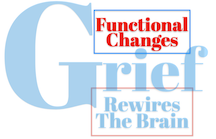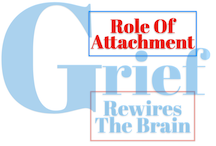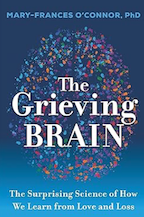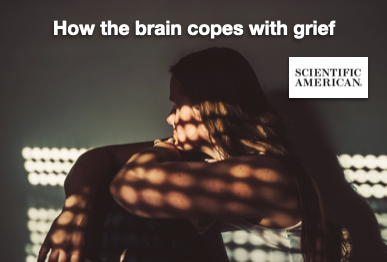By Don Elium, LMFT
By Don Elium, LMFT
Grief is a deeply personal experience that can profoundly impact our emotional and physical well-being. However, many may not realize how grief affects our brain's structure and function. What are the neurological mechanisms behind grief, particularly after the loss of a spouse or partner, and how can these changes manifest in our behavior and emotions?
“Grieving can be thought of as a form of learning—learning that this person is really gone, learning to predict their absence, learning what it means to be a person who has grief or to understand our own identity as a widow instead of a married person.”—-Mary Francis O’Connell, Scientific American
The Brain and Bonding: A Lifelong Connection: The human brain is wired to form and maintain attachments with loved ones. When we bond with someone, our brain encodes this connection as lasting and constant. This is why, when a spouse, partner, child, or very close friend dies, the brain struggles to accept their absence. The bond is so deeply ingrained that it feels unnatural for the brain to comprehend that the person is no longer there. The brain’s model of the world is disrupted, leading to the intense emotional pain that accompanies grief.
The Challenge of Updating the Brain's Predictions: Our brain relies on experience and repetition to make sense of the world. When a loved one dies, the brain must undergo a lengthy process of redrawing its internal map to update its predictions. This means learning to adjust to the new reality without the person. This process explains many complex emotions during mourning, such as disbelief, confusion, and yearning for the lost loved one.
Functional Changes in the Brain: Grief doesn't just affect our emotions; it can also lead to changes in our brain's functions. Functional MRI (fMRI) research has shown that grieving can alter connectivity in crucial brain circuits. For instance, studies have found that people grieving the loss of a child show increased activity in areas of the brain related to attention and emotion, such as the Ventral Attention Network, while experiencing reduced activity in regions involved in self-regulation, like the medial prefrontal cortex. These changes can make it difficult for grieving individuals to focus, regulate emotions, and feel like themselves.
Structural Alterations: Grief Rewires the Brain: Grief can lead to structural alterations in the brain and functional changes. Studies have shown that the severity of grief can be linked to changes in the brain’s white matter, which is involved in communication between different brain regions. These structural changes suggest that the brain undergoes a reorganization process as it adapts to the loss, which can be emotionally and physically exhausting.
The Role of the Attachment System: The attachment system is a set of brain circuits that help us form close bonds with others. When a loved one is lost, these circuits are disrupted, leading to feelings of longing and searching. The brain’s attachment system, which is driven by dopamine, a neurotransmitter associated with reward, continues to "search" for the lost loved one, even though they are no longer there. This search behavior is a significant part of why grief can feel so overwhelming and unending.
The Impact on Memory and Reflection The Default Mode Network (DMN), a brain network active during rest and self-reflection, plays a crucial role in processing grief. This network helps retrieve memories of the loved one, which can trigger intense emotional responses. Grieving individuals often find themselves ruminating on memories, which can be both comforting and painful. The DMN’s involvement in grief highlights how intertwined memory and emotion are during the mourning process.
Therapeutic Interventions: Helping the Brain Heal: Understanding the brain's response to grief has led to the development of targeted therapeutic interventions. Mindfulness-Based Cognitive Therapy (MBCT) and the Grief Recovery Method are two approaches that have shown promise in helping individuals manage grief. MBCT can reduce excessive connectivity between brain networks involved in rumination and stress, helping to improve emotional regulation. Though the process may be slow and challenging, these therapies can support the brain’s natural ability to adapt and heal over time. The Grief Recovery Method helps process the Resentments, Regrets, Unexpressed Emotions, and Unexpressed Gratitude, helps loosen the grip of the rumination and obsessions on the past, and frees up a person to live more in the present in acceptance.
Compassionate Understanding of Grief: Grief is not just an emotional experience but a profound neurological event that rewires the brain in response to loss. Understanding the brain’s role in grief can help us approach the grieving process with more compassion, both for ourselves and for others. By recognizing the significant changes in the brain during grief, we can better appreciate the depth of the mourning experience and the importance of providing support during such a difficult time.
When we’re grieving, the feelings we have, the thoughts that we have, even some of the things that we do—we feel like we’re losing our mind. But if you understand why your brain might be reacting this way, I think it gives us a little patience with ourselves. Grieving is a form of learning. And learning takes time and experience, and our brain is doing its best to help us. But it’s going to take some time. — Mary Francis O’Connor, PhD
—————Resources for this article include:
Mary Francis O’Connor now runs the Grief, Loss, and Social Stress (GLASS) Lab at the University of Arizona, where she tries to tease out the biological mechanisms underlying grief. In particular, she studies prolonged grief, a state in which people don’t seem to heal, instead staying immersed in their loss for years. In her book, The Grieving Brain (HarperOne, 2022), O’Connor explains how insight into brain circuits and neurotransmitters can enable us to navigate bereavement with self-compassion. “Grief is the cost of loving someone,” she writes. When a loved one dies, it can feel like we’ve lost a part of ourselves because their presence is coded into our neurons. ……. The Grieving Brain: The Surprising Science of How We Learn from Love and Loss by Mary Francis O’Connor.












